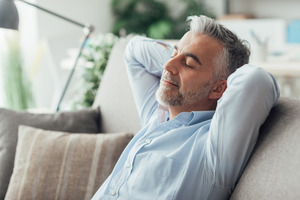
Many people with sleep apnea find that they’re unusually exhausted during the day. Naturally, when you’re tired, your first thought might be to take a nap. But while this might seem like a good idea on paper, the fact of the matter is that napping can be a bad idea when you’re suffering from a sleep disorder. Here’s why sleep apnea and naps don’t mix.
What Does It Mean If You Have Sleep Apnea?
Sleep apnea typically occurs when the airway becomes blocked, interrupting your breathing. This causes your body to wake up in an effort to get more oxygen. Oftentimes, people with sleep apnea have their breathing interrupted hundreds of times in a single night, which prevents them from getting a sufficient amount of quality sleep.
When left untreated, sleep apnea can put a lot of strain on your cardiovascular system, and it can eventually lead to a stroke or a heart attack. It may also put you at risk for other conditions such as Alzheimer’s.
Why Won’t Napping Help with Sleep Apnea?
Since sleep apnea prevents you from getting enough sleep, you might think that a nap can help you make up for lost rest. Unfortunately, the truth is that napping typically isn’t enough to repay a sleep debt, and you likely won’t feel any better once you wake up.
Furthermore, naps can potentially throw off your body’s sleep schedule, making it more difficult for you to fall asleep at night. This can be a significant issue when you’re already struggling with a sleep disorder that’s interfering with your ability to get quality rest.
How Can You Address Sleep Apnea Without Napping?
If you want to overcome your sleep apnea so that you can feel well-rested again, you need to seek out an appropriate form of treatment. In many cases, a custom-fitted oral appliance can help keep your airway clear so that your breathing remains uninterrupted during the night. Remember, you should never go to sleep without your chosen method of sleep apnea treatment.
There are other steps you can take that might help you manage your sleep apnea symptoms, such as:
- Changing your sleeping position. Sleeping on your back can worsen sleep apnea; it’s recommended that you sleep on your side when possible.
- Avoiding alcohol before bed. Alcohol can relax the muscles in your mouth and throat, making them more likely to collapse and block your airway.
- Losing weight. Obesity is a major risk factor for sleep apnea, and oftentimes losing weight can go a long way toward reducing your symptoms.
If you’d like additional advice for dealing with your sleep disorder, reach out to a professional today. You need to act quickly if you want to stop your sleep apnea from interfering with your quality of life.
About the Author
Dr. Rashpal Deol has spent over 35 years helping his patients enjoy quality dental care that has been tailored for their unique smiles. He is currently working on achieving Mastery status with the American Academy of Dental Sleep Medicine, and he is proud to offer oral appliance therapy as a nonsurgical solution for sleep apnea. To schedule a consultation with Dr. Deol at Oak Ridge Dental in San Ramon, visit his website or call (925) 735-6190.




